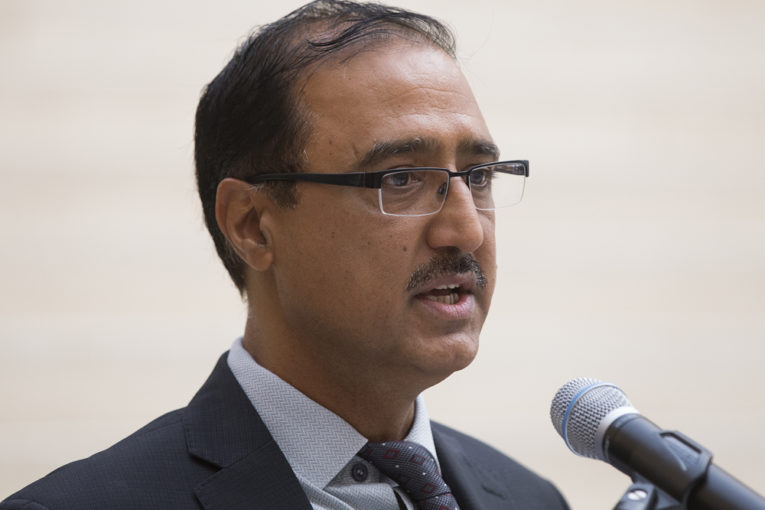
CALGARY — The federal government is keeping all its options open in its bid to build the troubled Trans Mountain pipeline expansion project, including an appeal to the Supreme Court to challenge last week’s surprising Federal Court of Appeal decision.
“All options are on the table at this time,” Natural Resources Minister Amarjeet Sohi said, when asked whether the government plans take the issue to the Supreme Court or introduce emergency legislation to bypass the ruling.
Ottawa has been reviewing last week’s unexpected ruling that overturned approvals for the Trans Mountain pipeline expansion from Alberta to B.C., stating that the National Energy Board failed to include a review of the impact of oil tanker traffic on marine life along the West Coast, and that the federal government failed to meaningfully consult with Indigenous groups before approving the project.
The next steps for the project would be announced in the coming days, Sohi said but declined to say when additional consultations or environmental reviews for Trans Mountain would begin.
Prime Minister Justin Trudeau, who is also in Edmonton to meet Alberta Premier Rachel Notley, said the government aims to advance the project in a way that won’t lead Ottawa back to the courts.
“Using a legislative trick might be satisfying in the short term, but it would set up fights and uncertainty for investors over the coming years on any other project, because you can’t have a government keep invoking those sorts of things on every given project,” Trudeau told a radio station Wednesday, ahead of a meeting with Notley, who has demanded an immediate appeal to the Supreme Court.
The federal government says the project is in the national interest as it is necessary to find new export markets for the country’s oil output, almost all of which is sent to the United States.
“We would like to see shovels in the ground as quickly as possible. This is a priority for Alberta and it’s a priority for the country,” Trudeau said, adding “we need to make sure it’s done right.”
The Trans Mountain expansion would add shipments of 590,000 barrels of oil per day from Alberta to metro Vancouver before those barrels are exported to Asian markets on oil tankers. The cost of the project is expected to rise past previous estimates of $7.4 billion, potentially reaching $9.3 billion if the expected in-service date is delayed until 2021, according to Kinder Morgan.
Premier Notley, who has pulled her government from the national climate plan until there’s a fix, said she wanted to have a “fulsome” conversation with Trudeau.
“The decision from the Federal Court of Appeal definitely presented us with a challenge,” she said at an unrelated event in Spruce Grove, Alta. “The issue is how do we get around that challenge.
“We know the federal government is still committed to get the pipeline built — they just spent $4.5 billion on it. If I were them, I’d want to get it built.”
But it needs to happen in a timely way, Notley said.
“We have people who are wondering whether they should be going to work in the next week or two,” she said. “We have investors in the energy industry, as well as the economy overall, who are looking at whether Canada can make things work.”
Notley said she agrees there has to be proper consultation with Indigenous people, but added the federal government must also address concerns about the National Energy Board.
“We cannot be held hostage to a regulatory merry-go-round that never ends.”
Despite the legal setback, Ottawa completed its $4.5 billion purchase of the Trans Mountain system and has recruited Ian Anderson, formerly the president of Houston-based Kinder Morgan Inc.’s Canadian unit, to lead the new company as president and CEO, while five other former Kinder Morgan executives will join him to operate the assets and lead the expansion.
The acquired assets would be organized in a Crown corporation called Trans Mountain Corp., which will be a wholly owned subsidiary of Canada Development Investment Corp., a division of the finance ministry.
“The private sector probably would have walked away from this project right after the decision from the federal court,” Sohi said, noting that the government wanted an experienced management team in place to ensure continuity.
The new company’s board of directors will include the current slate of directors from CDEV apart from Anderson.
• Email: [email protected] | Twitter: geoffreymorgan
With files from The Canadian Press
You can read more of the news on source
